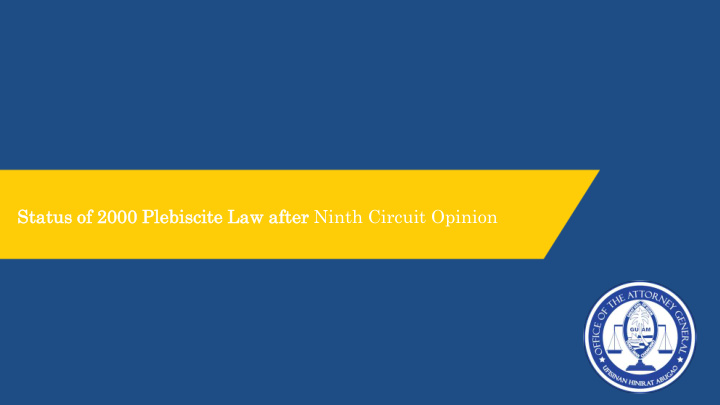



Stat atus o of 2000 P 2000 Plebi biscite Law aw af after Ninth Circuit Opinion
Guam’s plebiscite law background Guam’s 2000 Plebiscite Law provides for a “political status • plebiscite” to determine the official preference of the “Native Inhabitants of Guam” regarding Guam’s political relationship with the United States. Guam law defines “Native Inhabitants” as persons who • became U.S. citizens by virtue of the Guam Organic Act of 1950 and their descendants.
Guam’s plebiscite law background The plebiscite would ask eligible Native Inhabitants to choose among three options: (1) “Independence,” (2) “Free Association with the United States of America” or (3) “Statehood”
Davis v. Guam – Factual and procedural background Plaintiff, a resident of Guam, sought to register as a voter in • the plebiscite. He was denied registration because he did not meet the definition of “Native Inhabitant of Guam.” Plaintiff filed suit in 2011, challenging the 2000 Plebiscite Law • on grounds that it violated the Fourteenth and Fifteenth Amendments of the Constitution, the Voting Rights Act of 1965, and the Organic Act.
Davis v. Guam – Factual and procedural background • The Guam District Court granted motion for summary judgment and permanently enjoined Guam from conducting a plebiscite restricting voters to Native Inhabitants of Guam. • Guam appealed to the Ninth Circuit: Whether the provisions of that law restricting voting to “Native Inhabitants of Guam” constitutes an impermissible racial classification in violation of the Fifteenth Amendment.
Davis v. Guam – Factual and procedural background The Fifteenth Amendment provides: “The right of citizens of the United States to vote shall not be denied or abridged by the United States or by any State on account of race, color, or previous condition of servitude.”
Davis v. Guam – Ninth Circuit Opinion On appeal, Guam argued that the 2000 Plebiscite Law did not violate the 15 th Amendment because: • “Native Inhabitants of Guam” is a political classification based upon Organic Act citizenship status, not upon race; • the 2000 Plebiscite Law not motivated by racially discriminatory intent; • the plebiscite vote symbolic and not an “election”
Davis v. Guam – Ninth Circuit Opinion The Ninth Circuit held: 15th Amendment applies because plebiscite involves a public issue. Government • would transmit results to Congress, the President and the United Nations. Legislative history suggests “Native Inhabitants of Guam” a proxy for • “Chamorro” and a racial classification: 2000 Plebiscite Law nearly identical to 1997 Plebiscite Law which was • facially race-based The 2000 Plebiscite Law’s definition of “Native Inhabitants of Guam” is • nearly indistinguishable from the definitions of “Chamorro” in the 1997 Plebiscite Law The 2000 Plebiscite Law was enacted just one month after Rice v. Cayetano , • 528 U.S. 495 (2000)
Plebiscite Law: Current status • Guam enjoined from conducting a plebiscite limiting voters to Native Inhabitants of Guam • District Court of Guam awarded Plaintiff $947,717 in fees and costs plus interest • Awaiting Plaintiff’s claimed attorney fees and costs related to appeal
Recommend
More recommend